University Research Report: Social Media Recruitment in Australia
VerifiedAdded on 2023/06/10
|27
|7845
|401
Report
AI Summary
This research report investigates the evolving landscape of recruitment within Australia's hospitality industry, specifically focusing on the adoption of social media by small boutique hotels. The report explores the shift from traditional methods to online platforms, analyzing the motivations behind this trend and its effectiveness. It delves into the literature review to assess the impact of corporate reputation and global communicability on attracting potential candidates. The methodology involves empirical data surveys to highlight the various aspects of social media marketing and its application in recruitment. The discussion section examines the popularity of social media, differences between personal and professional networks, the appetite for using social media in recruitment, and the role of networking groups. The conclusion provides recommendations for HR practices tailored to small boutique hotels, emphasizing the strategic importance of social media in their recruitment processes.
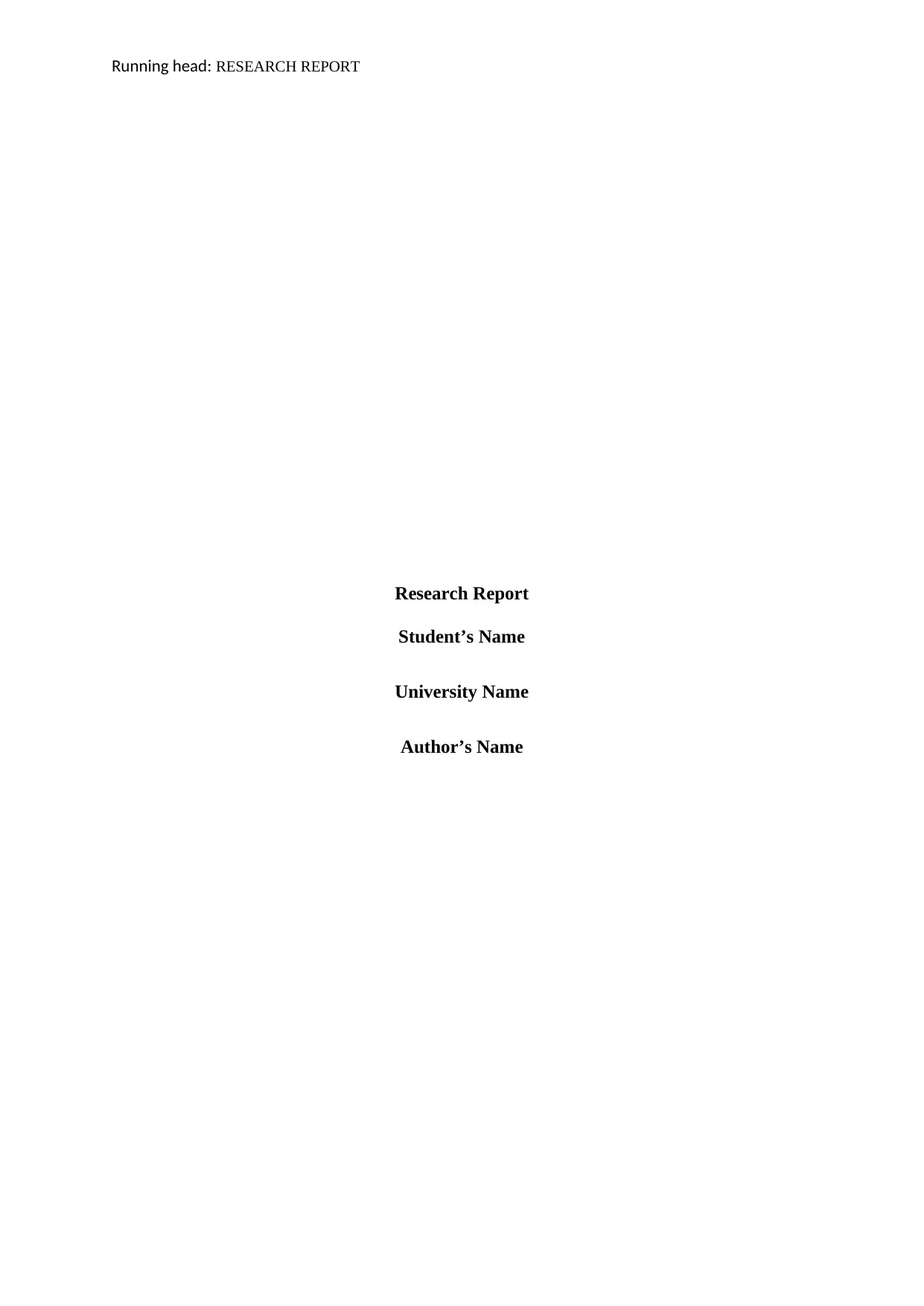
Running head: RESEARCH REPORT
Research Report
Student’s Name
University Name
Author’s Name
Research Report
Student’s Name
University Name
Author’s Name
Paraphrase This Document
Need a fresh take? Get an instant paraphrase of this document with our AI Paraphraser
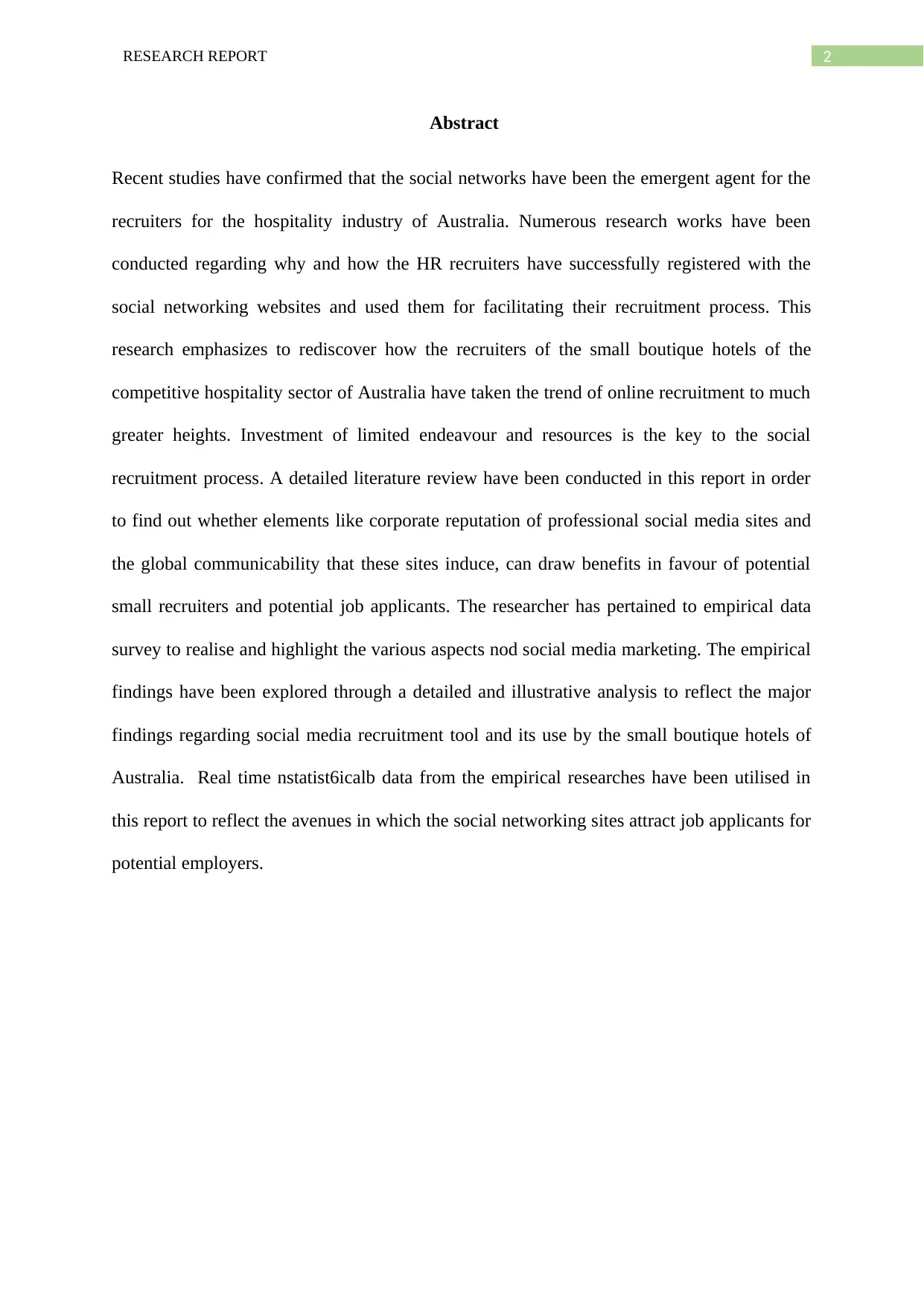
2RESEARCH REPORT
Abstract
Recent studies have confirmed that the social networks have been the emergent agent for the
recruiters for the hospitality industry of Australia. Numerous research works have been
conducted regarding why and how the HR recruiters have successfully registered with the
social networking websites and used them for facilitating their recruitment process. This
research emphasizes to rediscover how the recruiters of the small boutique hotels of the
competitive hospitality sector of Australia have taken the trend of online recruitment to much
greater heights. Investment of limited endeavour and resources is the key to the social
recruitment process. A detailed literature review have been conducted in this report in order
to find out whether elements like corporate reputation of professional social media sites and
the global communicability that these sites induce, can draw benefits in favour of potential
small recruiters and potential job applicants. The researcher has pertained to empirical data
survey to realise and highlight the various aspects nod social media marketing. The empirical
findings have been explored through a detailed and illustrative analysis to reflect the major
findings regarding social media recruitment tool and its use by the small boutique hotels of
Australia. Real time nstatist6icalb data from the empirical researches have been utilised in
this report to reflect the avenues in which the social networking sites attract job applicants for
potential employers.
Abstract
Recent studies have confirmed that the social networks have been the emergent agent for the
recruiters for the hospitality industry of Australia. Numerous research works have been
conducted regarding why and how the HR recruiters have successfully registered with the
social networking websites and used them for facilitating their recruitment process. This
research emphasizes to rediscover how the recruiters of the small boutique hotels of the
competitive hospitality sector of Australia have taken the trend of online recruitment to much
greater heights. Investment of limited endeavour and resources is the key to the social
recruitment process. A detailed literature review have been conducted in this report in order
to find out whether elements like corporate reputation of professional social media sites and
the global communicability that these sites induce, can draw benefits in favour of potential
small recruiters and potential job applicants. The researcher has pertained to empirical data
survey to realise and highlight the various aspects nod social media marketing. The empirical
findings have been explored through a detailed and illustrative analysis to reflect the major
findings regarding social media recruitment tool and its use by the small boutique hotels of
Australia. Real time nstatist6icalb data from the empirical researches have been utilised in
this report to reflect the avenues in which the social networking sites attract job applicants for
potential employers.
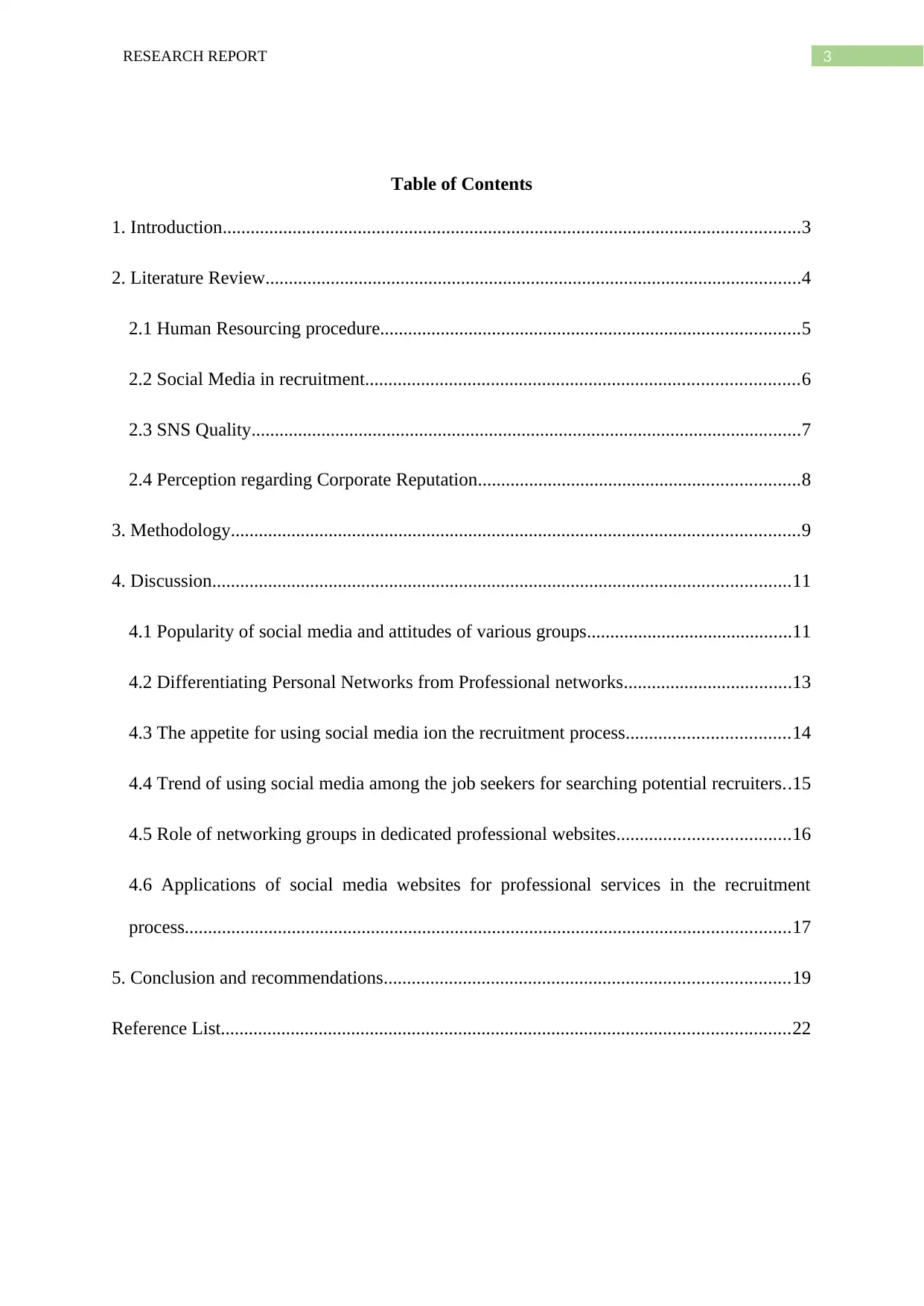
3RESEARCH REPORT
Table of Contents
1. Introduction............................................................................................................................3
2. Literature Review...................................................................................................................4
2.1 Human Resourcing procedure..........................................................................................5
2.2 Social Media in recruitment.............................................................................................6
2.3 SNS Quality......................................................................................................................7
2.4 Perception regarding Corporate Reputation.....................................................................8
3. Methodology..........................................................................................................................9
4. Discussion............................................................................................................................11
4.1 Popularity of social media and attitudes of various groups............................................11
4.2 Differentiating Personal Networks from Professional networks....................................13
4.3 The appetite for using social media ion the recruitment process...................................14
4.4 Trend of using social media among the job seekers for searching potential recruiters..15
4.5 Role of networking groups in dedicated professional websites.....................................16
4.6 Applications of social media websites for professional services in the recruitment
process..................................................................................................................................17
5. Conclusion and recommendations.......................................................................................19
Reference List..........................................................................................................................22
Table of Contents
1. Introduction............................................................................................................................3
2. Literature Review...................................................................................................................4
2.1 Human Resourcing procedure..........................................................................................5
2.2 Social Media in recruitment.............................................................................................6
2.3 SNS Quality......................................................................................................................7
2.4 Perception regarding Corporate Reputation.....................................................................8
3. Methodology..........................................................................................................................9
4. Discussion............................................................................................................................11
4.1 Popularity of social media and attitudes of various groups............................................11
4.2 Differentiating Personal Networks from Professional networks....................................13
4.3 The appetite for using social media ion the recruitment process...................................14
4.4 Trend of using social media among the job seekers for searching potential recruiters..15
4.5 Role of networking groups in dedicated professional websites.....................................16
4.6 Applications of social media websites for professional services in the recruitment
process..................................................................................................................................17
5. Conclusion and recommendations.......................................................................................19
Reference List..........................................................................................................................22
⊘ This is a preview!⊘
Do you want full access?
Subscribe today to unlock all pages.

Trusted by 1+ million students worldwide
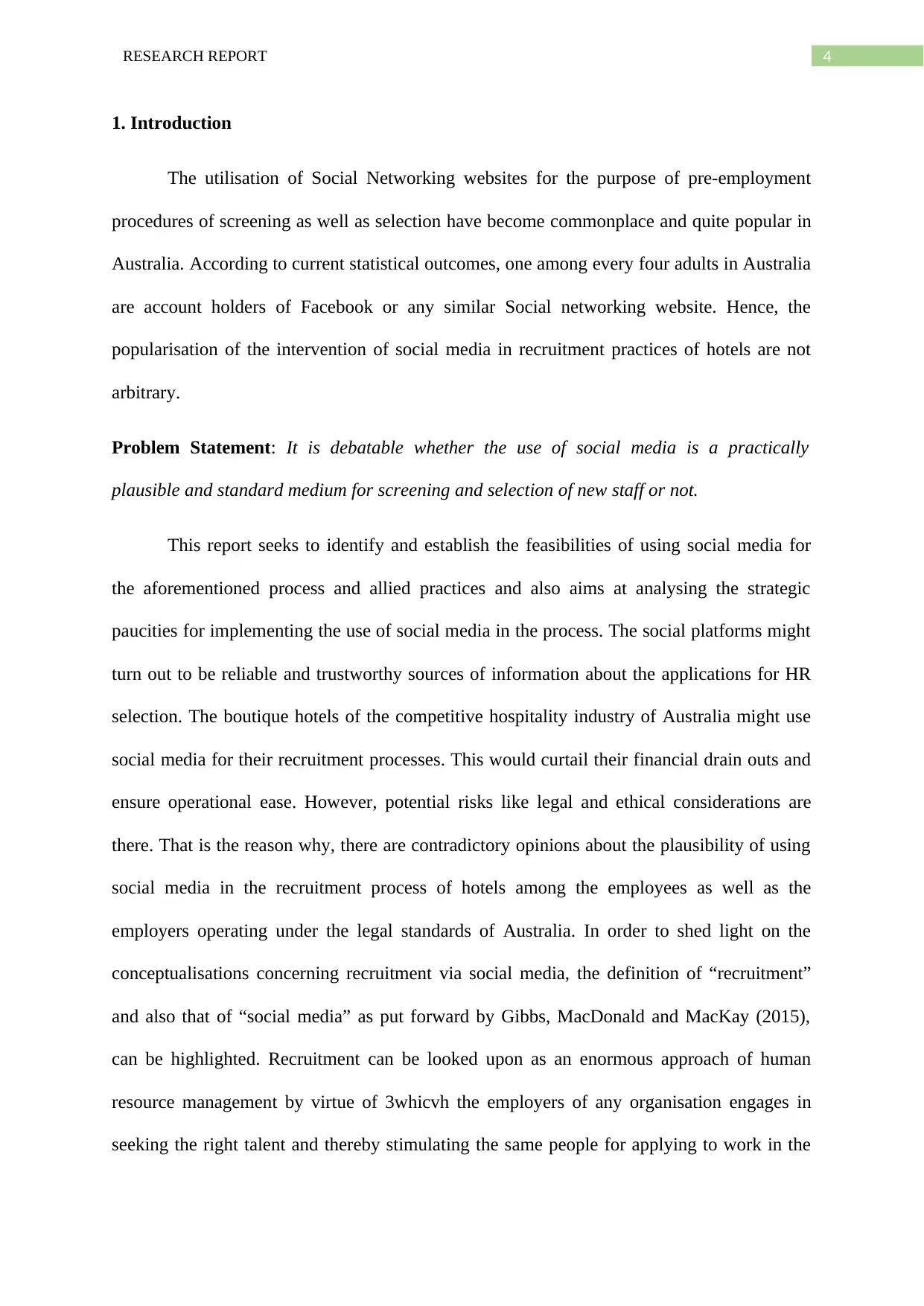
4RESEARCH REPORT
1. Introduction
The utilisation of Social Networking websites for the purpose of pre-employment
procedures of screening as well as selection have become commonplace and quite popular in
Australia. According to current statistical outcomes, one among every four adults in Australia
are account holders of Facebook or any similar Social networking website. Hence, the
popularisation of the intervention of social media in recruitment practices of hotels are not
arbitrary.
Problem Statement: It is debatable whether the use of social media is a practically
plausible and standard medium for screening and selection of new staff or not.
This report seeks to identify and establish the feasibilities of using social media for
the aforementioned process and allied practices and also aims at analysing the strategic
paucities for implementing the use of social media in the process. The social platforms might
turn out to be reliable and trustworthy sources of information about the applications for HR
selection. The boutique hotels of the competitive hospitality industry of Australia might use
social media for their recruitment processes. This would curtail their financial drain outs and
ensure operational ease. However, potential risks like legal and ethical considerations are
there. That is the reason why, there are contradictory opinions about the plausibility of using
social media in the recruitment process of hotels among the employees as well as the
employers operating under the legal standards of Australia. In order to shed light on the
conceptualisations concerning recruitment via social media, the definition of “recruitment”
and also that of “social media” as put forward by Gibbs, MacDonald and MacKay (2015),
can be highlighted. Recruitment can be looked upon as an enormous approach of human
resource management by virtue of 3whicvh the employers of any organisation engages in
seeking the right talent and thereby stimulating the same people for applying to work in the
1. Introduction
The utilisation of Social Networking websites for the purpose of pre-employment
procedures of screening as well as selection have become commonplace and quite popular in
Australia. According to current statistical outcomes, one among every four adults in Australia
are account holders of Facebook or any similar Social networking website. Hence, the
popularisation of the intervention of social media in recruitment practices of hotels are not
arbitrary.
Problem Statement: It is debatable whether the use of social media is a practically
plausible and standard medium for screening and selection of new staff or not.
This report seeks to identify and establish the feasibilities of using social media for
the aforementioned process and allied practices and also aims at analysing the strategic
paucities for implementing the use of social media in the process. The social platforms might
turn out to be reliable and trustworthy sources of information about the applications for HR
selection. The boutique hotels of the competitive hospitality industry of Australia might use
social media for their recruitment processes. This would curtail their financial drain outs and
ensure operational ease. However, potential risks like legal and ethical considerations are
there. That is the reason why, there are contradictory opinions about the plausibility of using
social media in the recruitment process of hotels among the employees as well as the
employers operating under the legal standards of Australia. In order to shed light on the
conceptualisations concerning recruitment via social media, the definition of “recruitment”
and also that of “social media” as put forward by Gibbs, MacDonald and MacKay (2015),
can be highlighted. Recruitment can be looked upon as an enormous approach of human
resource management by virtue of 3whicvh the employers of any organisation engages in
seeking the right talent and thereby stimulating the same people for applying to work in the
Paraphrase This Document
Need a fresh take? Get an instant paraphrase of this document with our AI Paraphraser
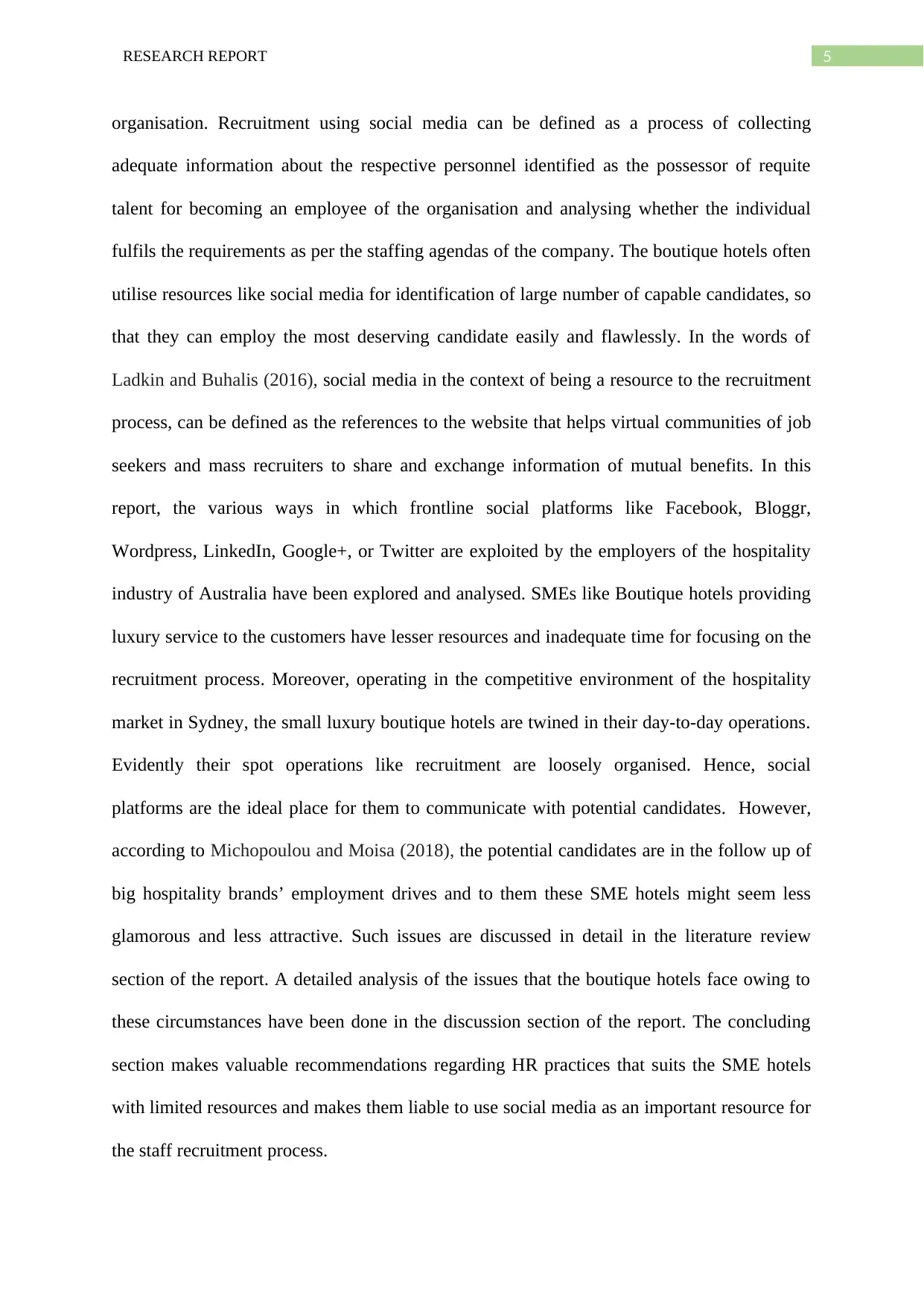
5RESEARCH REPORT
organisation. Recruitment using social media can be defined as a process of collecting
adequate information about the respective personnel identified as the possessor of requite
talent for becoming an employee of the organisation and analysing whether the individual
fulfils the requirements as per the staffing agendas of the company. The boutique hotels often
utilise resources like social media for identification of large number of capable candidates, so
that they can employ the most deserving candidate easily and flawlessly. In the words of
Ladkin and Buhalis (2016), social media in the context of being a resource to the recruitment
process, can be defined as the references to the website that helps virtual communities of job
seekers and mass recruiters to share and exchange information of mutual benefits. In this
report, the various ways in which frontline social platforms like Facebook, Bloggr,
Wordpress, LinkedIn, Google+, or Twitter are exploited by the employers of the hospitality
industry of Australia have been explored and analysed. SMEs like Boutique hotels providing
luxury service to the customers have lesser resources and inadequate time for focusing on the
recruitment process. Moreover, operating in the competitive environment of the hospitality
market in Sydney, the small luxury boutique hotels are twined in their day-to-day operations.
Evidently their spot operations like recruitment are loosely organised. Hence, social
platforms are the ideal place for them to communicate with potential candidates. However,
according to Michopoulou and Moisa (2018), the potential candidates are in the follow up of
big hospitality brands’ employment drives and to them these SME hotels might seem less
glamorous and less attractive. Such issues are discussed in detail in the literature review
section of the report. A detailed analysis of the issues that the boutique hotels face owing to
these circumstances have been done in the discussion section of the report. The concluding
section makes valuable recommendations regarding HR practices that suits the SME hotels
with limited resources and makes them liable to use social media as an important resource for
the staff recruitment process.
organisation. Recruitment using social media can be defined as a process of collecting
adequate information about the respective personnel identified as the possessor of requite
talent for becoming an employee of the organisation and analysing whether the individual
fulfils the requirements as per the staffing agendas of the company. The boutique hotels often
utilise resources like social media for identification of large number of capable candidates, so
that they can employ the most deserving candidate easily and flawlessly. In the words of
Ladkin and Buhalis (2016), social media in the context of being a resource to the recruitment
process, can be defined as the references to the website that helps virtual communities of job
seekers and mass recruiters to share and exchange information of mutual benefits. In this
report, the various ways in which frontline social platforms like Facebook, Bloggr,
Wordpress, LinkedIn, Google+, or Twitter are exploited by the employers of the hospitality
industry of Australia have been explored and analysed. SMEs like Boutique hotels providing
luxury service to the customers have lesser resources and inadequate time for focusing on the
recruitment process. Moreover, operating in the competitive environment of the hospitality
market in Sydney, the small luxury boutique hotels are twined in their day-to-day operations.
Evidently their spot operations like recruitment are loosely organised. Hence, social
platforms are the ideal place for them to communicate with potential candidates. However,
according to Michopoulou and Moisa (2018), the potential candidates are in the follow up of
big hospitality brands’ employment drives and to them these SME hotels might seem less
glamorous and less attractive. Such issues are discussed in detail in the literature review
section of the report. A detailed analysis of the issues that the boutique hotels face owing to
these circumstances have been done in the discussion section of the report. The concluding
section makes valuable recommendations regarding HR practices that suits the SME hotels
with limited resources and makes them liable to use social media as an important resource for
the staff recruitment process.
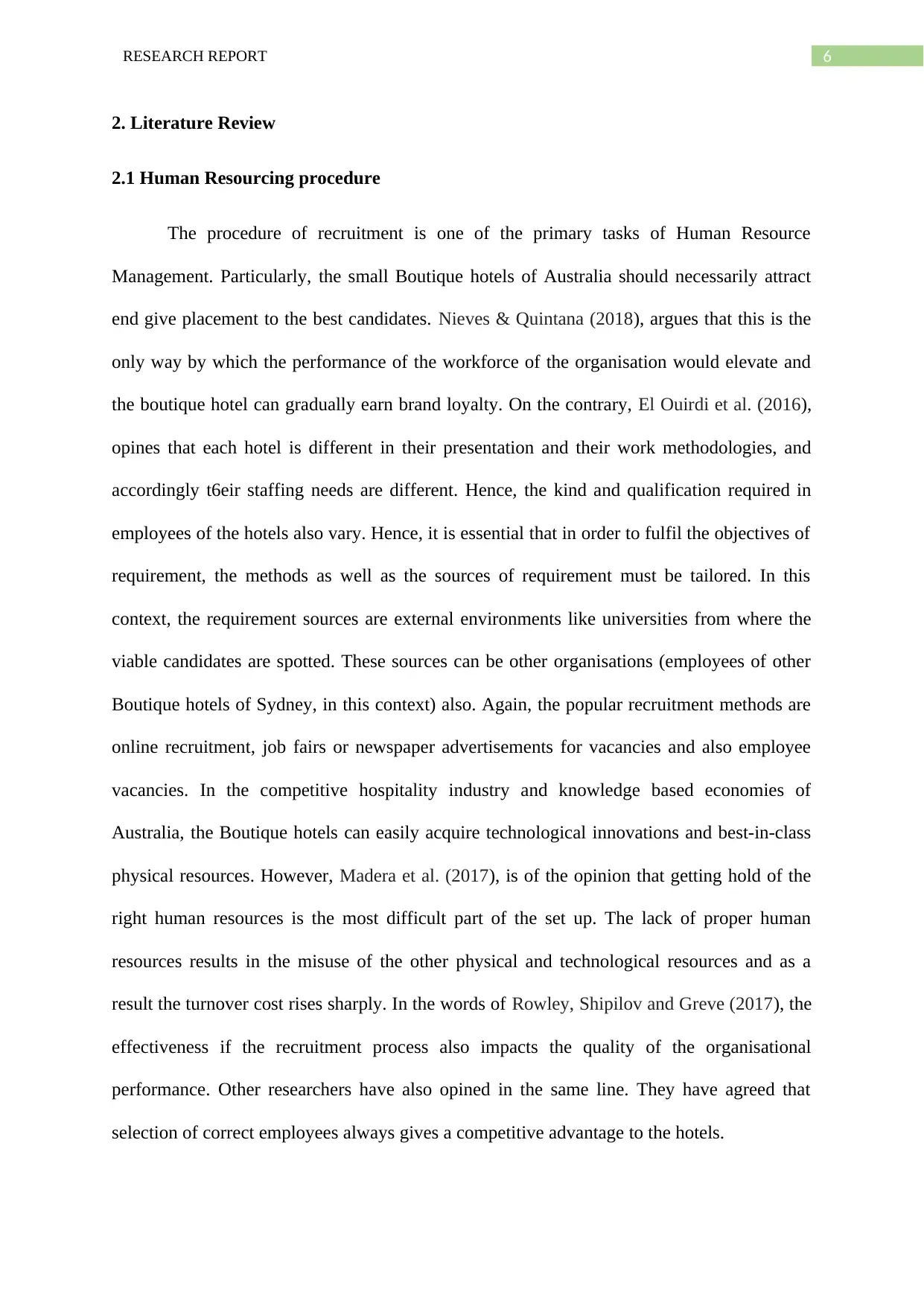
6RESEARCH REPORT
2. Literature Review
2.1 Human Resourcing procedure
The procedure of recruitment is one of the primary tasks of Human Resource
Management. Particularly, the small Boutique hotels of Australia should necessarily attract
end give placement to the best candidates. Nieves & Quintana (2018), argues that this is the
only way by which the performance of the workforce of the organisation would elevate and
the boutique hotel can gradually earn brand loyalty. On the contrary, El Ouirdi et al. (2016),
opines that each hotel is different in their presentation and their work methodologies, and
accordingly t6eir staffing needs are different. Hence, the kind and qualification required in
employees of the hotels also vary. Hence, it is essential that in order to fulfil the objectives of
requirement, the methods as well as the sources of requirement must be tailored. In this
context, the requirement sources are external environments like universities from where the
viable candidates are spotted. These sources can be other organisations (employees of other
Boutique hotels of Sydney, in this context) also. Again, the popular recruitment methods are
online recruitment, job fairs or newspaper advertisements for vacancies and also employee
vacancies. In the competitive hospitality industry and knowledge based economies of
Australia, the Boutique hotels can easily acquire technological innovations and best-in-class
physical resources. However, Madera et al. (2017), is of the opinion that getting hold of the
right human resources is the most difficult part of the set up. The lack of proper human
resources results in the misuse of the other physical and technological resources and as a
result the turnover cost rises sharply. In the words of Rowley, Shipilov and Greve (2017), the
effectiveness if the recruitment process also impacts the quality of the organisational
performance. Other researchers have also opined in the same line. They have agreed that
selection of correct employees always gives a competitive advantage to the hotels.
2. Literature Review
2.1 Human Resourcing procedure
The procedure of recruitment is one of the primary tasks of Human Resource
Management. Particularly, the small Boutique hotels of Australia should necessarily attract
end give placement to the best candidates. Nieves & Quintana (2018), argues that this is the
only way by which the performance of the workforce of the organisation would elevate and
the boutique hotel can gradually earn brand loyalty. On the contrary, El Ouirdi et al. (2016),
opines that each hotel is different in their presentation and their work methodologies, and
accordingly t6eir staffing needs are different. Hence, the kind and qualification required in
employees of the hotels also vary. Hence, it is essential that in order to fulfil the objectives of
requirement, the methods as well as the sources of requirement must be tailored. In this
context, the requirement sources are external environments like universities from where the
viable candidates are spotted. These sources can be other organisations (employees of other
Boutique hotels of Sydney, in this context) also. Again, the popular recruitment methods are
online recruitment, job fairs or newspaper advertisements for vacancies and also employee
vacancies. In the competitive hospitality industry and knowledge based economies of
Australia, the Boutique hotels can easily acquire technological innovations and best-in-class
physical resources. However, Madera et al. (2017), is of the opinion that getting hold of the
right human resources is the most difficult part of the set up. The lack of proper human
resources results in the misuse of the other physical and technological resources and as a
result the turnover cost rises sharply. In the words of Rowley, Shipilov and Greve (2017), the
effectiveness if the recruitment process also impacts the quality of the organisational
performance. Other researchers have also opined in the same line. They have agreed that
selection of correct employees always gives a competitive advantage to the hotels.
⊘ This is a preview!⊘
Do you want full access?
Subscribe today to unlock all pages.

Trusted by 1+ million students worldwide
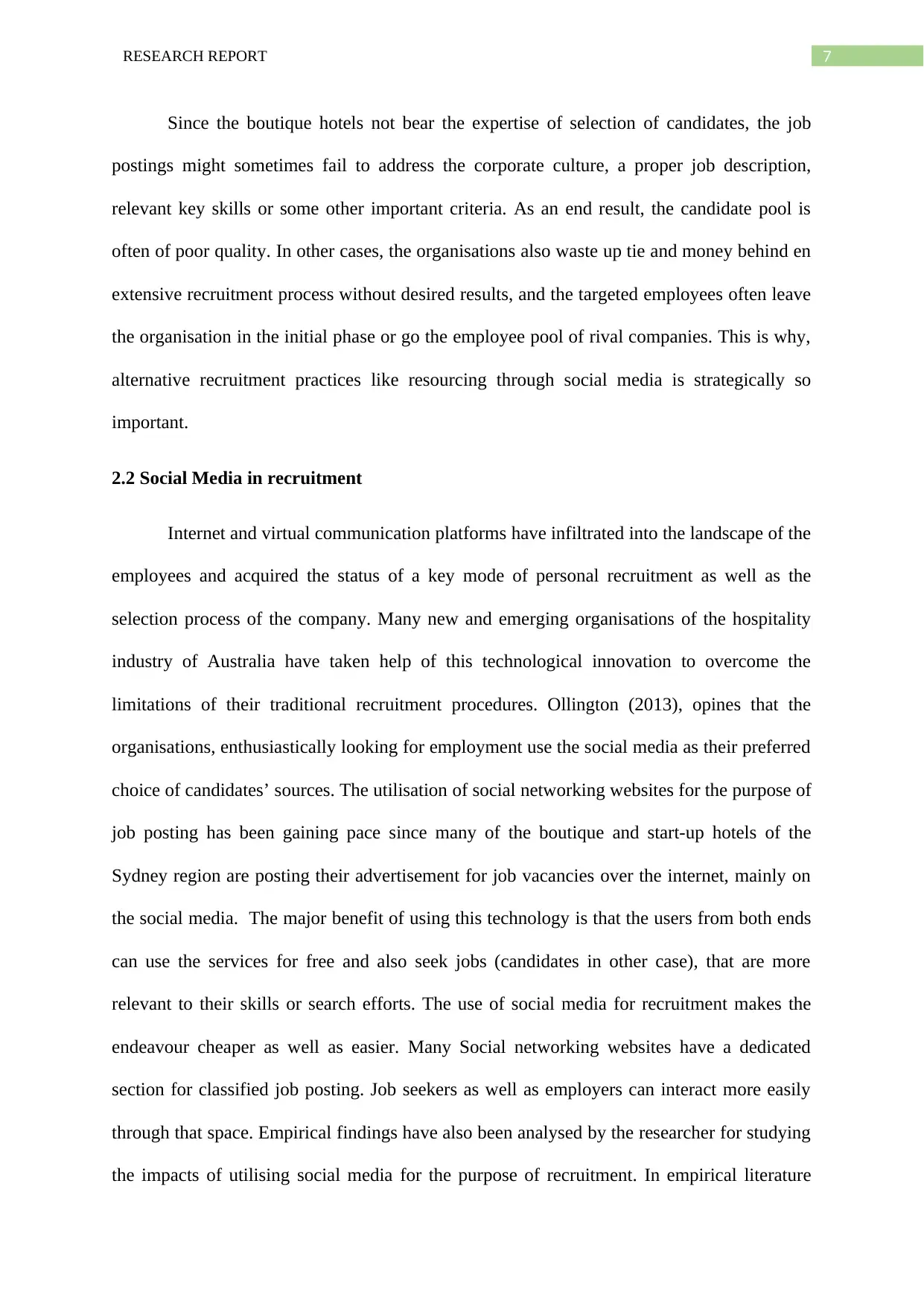
7RESEARCH REPORT
Since the boutique hotels not bear the expertise of selection of candidates, the job
postings might sometimes fail to address the corporate culture, a proper job description,
relevant key skills or some other important criteria. As an end result, the candidate pool is
often of poor quality. In other cases, the organisations also waste up tie and money behind en
extensive recruitment process without desired results, and the targeted employees often leave
the organisation in the initial phase or go the employee pool of rival companies. This is why,
alternative recruitment practices like resourcing through social media is strategically so
important.
2.2 Social Media in recruitment
Internet and virtual communication platforms have infiltrated into the landscape of the
employees and acquired the status of a key mode of personal recruitment as well as the
selection process of the company. Many new and emerging organisations of the hospitality
industry of Australia have taken help of this technological innovation to overcome the
limitations of their traditional recruitment procedures. Ollington (2013), opines that the
organisations, enthusiastically looking for employment use the social media as their preferred
choice of candidates’ sources. The utilisation of social networking websites for the purpose of
job posting has been gaining pace since many of the boutique and start-up hotels of the
Sydney region are posting their advertisement for job vacancies over the internet, mainly on
the social media. The major benefit of using this technology is that the users from both ends
can use the services for free and also seek jobs (candidates in other case), that are more
relevant to their skills or search efforts. The use of social media for recruitment makes the
endeavour cheaper as well as easier. Many Social networking websites have a dedicated
section for classified job posting. Job seekers as well as employers can interact more easily
through that space. Empirical findings have also been analysed by the researcher for studying
the impacts of utilising social media for the purpose of recruitment. In empirical literature
Since the boutique hotels not bear the expertise of selection of candidates, the job
postings might sometimes fail to address the corporate culture, a proper job description,
relevant key skills or some other important criteria. As an end result, the candidate pool is
often of poor quality. In other cases, the organisations also waste up tie and money behind en
extensive recruitment process without desired results, and the targeted employees often leave
the organisation in the initial phase or go the employee pool of rival companies. This is why,
alternative recruitment practices like resourcing through social media is strategically so
important.
2.2 Social Media in recruitment
Internet and virtual communication platforms have infiltrated into the landscape of the
employees and acquired the status of a key mode of personal recruitment as well as the
selection process of the company. Many new and emerging organisations of the hospitality
industry of Australia have taken help of this technological innovation to overcome the
limitations of their traditional recruitment procedures. Ollington (2013), opines that the
organisations, enthusiastically looking for employment use the social media as their preferred
choice of candidates’ sources. The utilisation of social networking websites for the purpose of
job posting has been gaining pace since many of the boutique and start-up hotels of the
Sydney region are posting their advertisement for job vacancies over the internet, mainly on
the social media. The major benefit of using this technology is that the users from both ends
can use the services for free and also seek jobs (candidates in other case), that are more
relevant to their skills or search efforts. The use of social media for recruitment makes the
endeavour cheaper as well as easier. Many Social networking websites have a dedicated
section for classified job posting. Job seekers as well as employers can interact more easily
through that space. Empirical findings have also been analysed by the researcher for studying
the impacts of utilising social media for the purpose of recruitment. In empirical literature
Paraphrase This Document
Need a fresh take? Get an instant paraphrase of this document with our AI Paraphraser
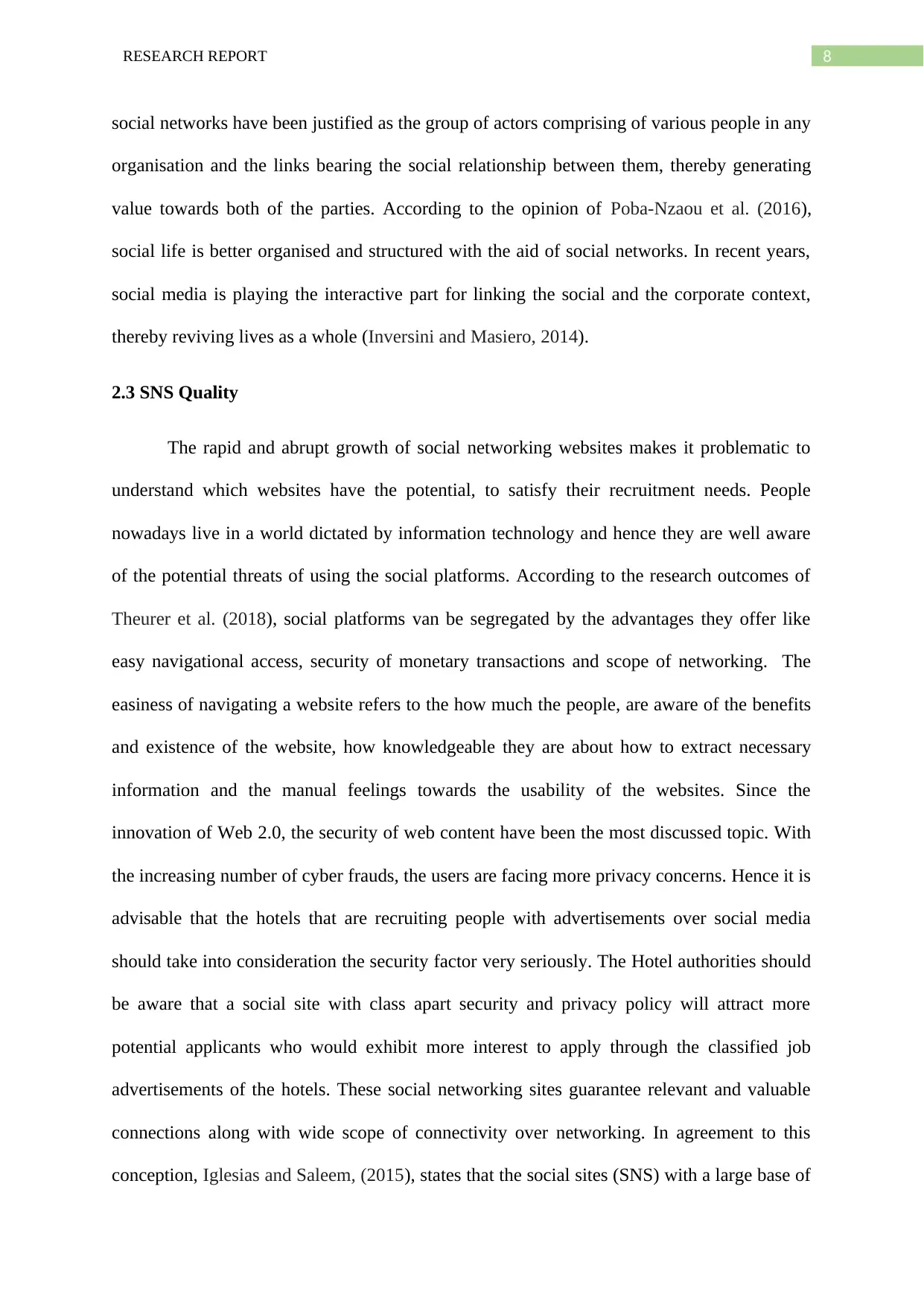
8RESEARCH REPORT
social networks have been justified as the group of actors comprising of various people in any
organisation and the links bearing the social relationship between them, thereby generating
value towards both of the parties. According to the opinion of Poba-Nzaou et al. (2016),
social life is better organised and structured with the aid of social networks. In recent years,
social media is playing the interactive part for linking the social and the corporate context,
thereby reviving lives as a whole (Inversini and Masiero, 2014).
2.3 SNS Quality
The rapid and abrupt growth of social networking websites makes it problematic to
understand which websites have the potential, to satisfy their recruitment needs. People
nowadays live in a world dictated by information technology and hence they are well aware
of the potential threats of using the social platforms. According to the research outcomes of
Theurer et al. (2018), social platforms van be segregated by the advantages they offer like
easy navigational access, security of monetary transactions and scope of networking. The
easiness of navigating a website refers to the how much the people, are aware of the benefits
and existence of the website, how knowledgeable they are about how to extract necessary
information and the manual feelings towards the usability of the websites. Since the
innovation of Web 2.0, the security of web content have been the most discussed topic. With
the increasing number of cyber frauds, the users are facing more privacy concerns. Hence it is
advisable that the hotels that are recruiting people with advertisements over social media
should take into consideration the security factor very seriously. The Hotel authorities should
be aware that a social site with class apart security and privacy policy will attract more
potential applicants who would exhibit more interest to apply through the classified job
advertisements of the hotels. These social networking sites guarantee relevant and valuable
connections along with wide scope of connectivity over networking. In agreement to this
conception, Iglesias and Saleem, (2015), states that the social sites (SNS) with a large base of
social networks have been justified as the group of actors comprising of various people in any
organisation and the links bearing the social relationship between them, thereby generating
value towards both of the parties. According to the opinion of Poba-Nzaou et al. (2016),
social life is better organised and structured with the aid of social networks. In recent years,
social media is playing the interactive part for linking the social and the corporate context,
thereby reviving lives as a whole (Inversini and Masiero, 2014).
2.3 SNS Quality
The rapid and abrupt growth of social networking websites makes it problematic to
understand which websites have the potential, to satisfy their recruitment needs. People
nowadays live in a world dictated by information technology and hence they are well aware
of the potential threats of using the social platforms. According to the research outcomes of
Theurer et al. (2018), social platforms van be segregated by the advantages they offer like
easy navigational access, security of monetary transactions and scope of networking. The
easiness of navigating a website refers to the how much the people, are aware of the benefits
and existence of the website, how knowledgeable they are about how to extract necessary
information and the manual feelings towards the usability of the websites. Since the
innovation of Web 2.0, the security of web content have been the most discussed topic. With
the increasing number of cyber frauds, the users are facing more privacy concerns. Hence it is
advisable that the hotels that are recruiting people with advertisements over social media
should take into consideration the security factor very seriously. The Hotel authorities should
be aware that a social site with class apart security and privacy policy will attract more
potential applicants who would exhibit more interest to apply through the classified job
advertisements of the hotels. These social networking sites guarantee relevant and valuable
connections along with wide scope of connectivity over networking. In agreement to this
conception, Iglesias and Saleem, (2015), states that the social sites (SNS) with a large base of
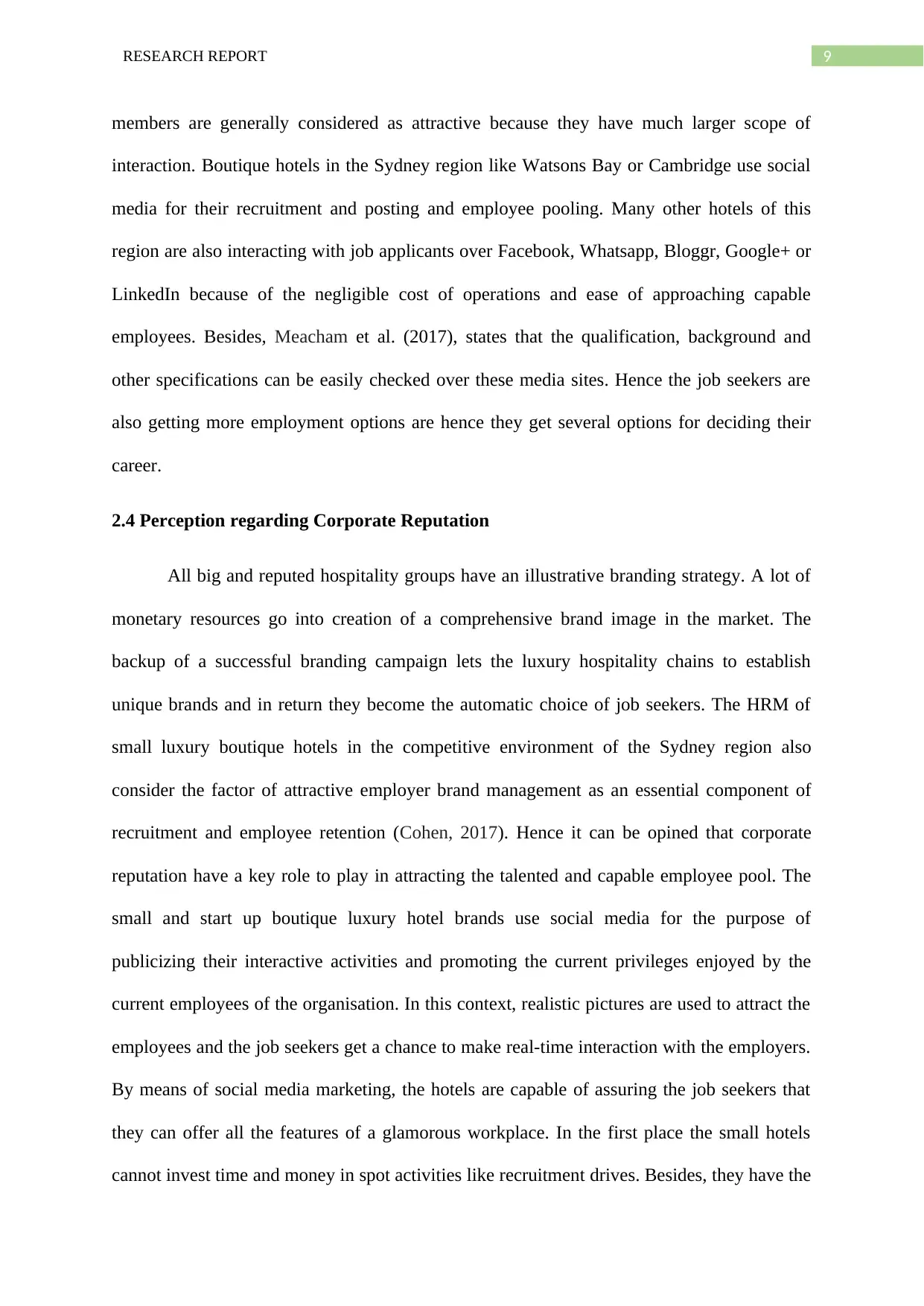
9RESEARCH REPORT
members are generally considered as attractive because they have much larger scope of
interaction. Boutique hotels in the Sydney region like Watsons Bay or Cambridge use social
media for their recruitment and posting and employee pooling. Many other hotels of this
region are also interacting with job applicants over Facebook, Whatsapp, Bloggr, Google+ or
LinkedIn because of the negligible cost of operations and ease of approaching capable
employees. Besides, Meacham et al. (2017), states that the qualification, background and
other specifications can be easily checked over these media sites. Hence the job seekers are
also getting more employment options are hence they get several options for deciding their
career.
2.4 Perception regarding Corporate Reputation
All big and reputed hospitality groups have an illustrative branding strategy. A lot of
monetary resources go into creation of a comprehensive brand image in the market. The
backup of a successful branding campaign lets the luxury hospitality chains to establish
unique brands and in return they become the automatic choice of job seekers. The HRM of
small luxury boutique hotels in the competitive environment of the Sydney region also
consider the factor of attractive employer brand management as an essential component of
recruitment and employee retention (Cohen, 2017). Hence it can be opined that corporate
reputation have a key role to play in attracting the talented and capable employee pool. The
small and start up boutique luxury hotel brands use social media for the purpose of
publicizing their interactive activities and promoting the current privileges enjoyed by the
current employees of the organisation. In this context, realistic pictures are used to attract the
employees and the job seekers get a chance to make real-time interaction with the employers.
By means of social media marketing, the hotels are capable of assuring the job seekers that
they can offer all the features of a glamorous workplace. In the first place the small hotels
cannot invest time and money in spot activities like recruitment drives. Besides, they have the
members are generally considered as attractive because they have much larger scope of
interaction. Boutique hotels in the Sydney region like Watsons Bay or Cambridge use social
media for their recruitment and posting and employee pooling. Many other hotels of this
region are also interacting with job applicants over Facebook, Whatsapp, Bloggr, Google+ or
LinkedIn because of the negligible cost of operations and ease of approaching capable
employees. Besides, Meacham et al. (2017), states that the qualification, background and
other specifications can be easily checked over these media sites. Hence the job seekers are
also getting more employment options are hence they get several options for deciding their
career.
2.4 Perception regarding Corporate Reputation
All big and reputed hospitality groups have an illustrative branding strategy. A lot of
monetary resources go into creation of a comprehensive brand image in the market. The
backup of a successful branding campaign lets the luxury hospitality chains to establish
unique brands and in return they become the automatic choice of job seekers. The HRM of
small luxury boutique hotels in the competitive environment of the Sydney region also
consider the factor of attractive employer brand management as an essential component of
recruitment and employee retention (Cohen, 2017). Hence it can be opined that corporate
reputation have a key role to play in attracting the talented and capable employee pool. The
small and start up boutique luxury hotel brands use social media for the purpose of
publicizing their interactive activities and promoting the current privileges enjoyed by the
current employees of the organisation. In this context, realistic pictures are used to attract the
employees and the job seekers get a chance to make real-time interaction with the employers.
By means of social media marketing, the hotels are capable of assuring the job seekers that
they can offer all the features of a glamorous workplace. In the first place the small hotels
cannot invest time and money in spot activities like recruitment drives. Besides, they have the
⊘ This is a preview!⊘
Do you want full access?
Subscribe today to unlock all pages.

Trusted by 1+ million students worldwide
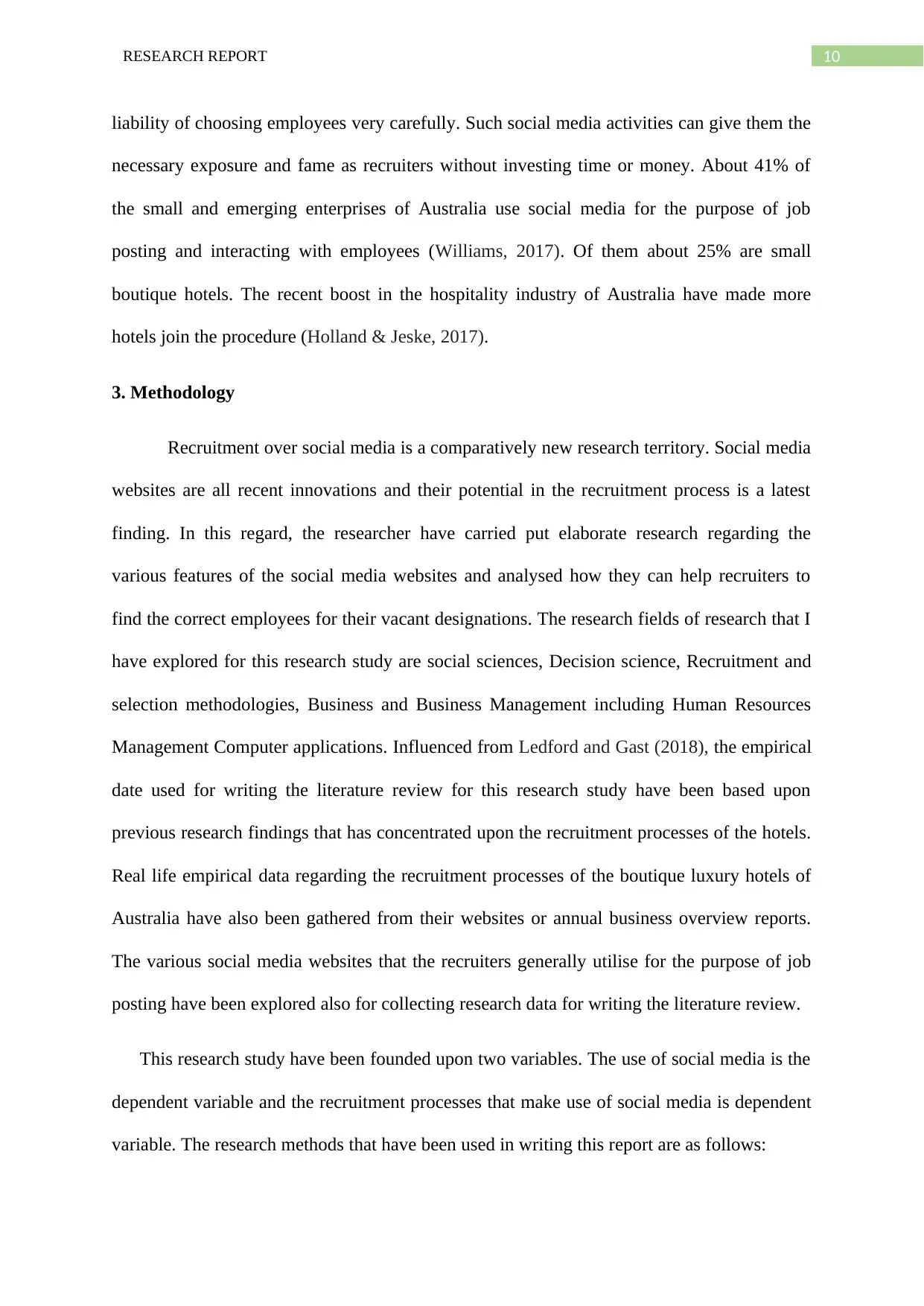
10RESEARCH REPORT
liability of choosing employees very carefully. Such social media activities can give them the
necessary exposure and fame as recruiters without investing time or money. About 41% of
the small and emerging enterprises of Australia use social media for the purpose of job
posting and interacting with employees (Williams, 2017). Of them about 25% are small
boutique hotels. The recent boost in the hospitality industry of Australia have made more
hotels join the procedure (Holland & Jeske, 2017).
3. Methodology
Recruitment over social media is a comparatively new research territory. Social media
websites are all recent innovations and their potential in the recruitment process is a latest
finding. In this regard, the researcher have carried put elaborate research regarding the
various features of the social media websites and analysed how they can help recruiters to
find the correct employees for their vacant designations. The research fields of research that I
have explored for this research study are social sciences, Decision science, Recruitment and
selection methodologies, Business and Business Management including Human Resources
Management Computer applications. Influenced from Ledford and Gast (2018), the empirical
date used for writing the literature review for this research study have been based upon
previous research findings that has concentrated upon the recruitment processes of the hotels.
Real life empirical data regarding the recruitment processes of the boutique luxury hotels of
Australia have also been gathered from their websites or annual business overview reports.
The various social media websites that the recruiters generally utilise for the purpose of job
posting have been explored also for collecting research data for writing the literature review.
This research study have been founded upon two variables. The use of social media is the
dependent variable and the recruitment processes that make use of social media is dependent
variable. The research methods that have been used in writing this report are as follows:
liability of choosing employees very carefully. Such social media activities can give them the
necessary exposure and fame as recruiters without investing time or money. About 41% of
the small and emerging enterprises of Australia use social media for the purpose of job
posting and interacting with employees (Williams, 2017). Of them about 25% are small
boutique hotels. The recent boost in the hospitality industry of Australia have made more
hotels join the procedure (Holland & Jeske, 2017).
3. Methodology
Recruitment over social media is a comparatively new research territory. Social media
websites are all recent innovations and their potential in the recruitment process is a latest
finding. In this regard, the researcher have carried put elaborate research regarding the
various features of the social media websites and analysed how they can help recruiters to
find the correct employees for their vacant designations. The research fields of research that I
have explored for this research study are social sciences, Decision science, Recruitment and
selection methodologies, Business and Business Management including Human Resources
Management Computer applications. Influenced from Ledford and Gast (2018), the empirical
date used for writing the literature review for this research study have been based upon
previous research findings that has concentrated upon the recruitment processes of the hotels.
Real life empirical data regarding the recruitment processes of the boutique luxury hotels of
Australia have also been gathered from their websites or annual business overview reports.
The various social media websites that the recruiters generally utilise for the purpose of job
posting have been explored also for collecting research data for writing the literature review.
This research study have been founded upon two variables. The use of social media is the
dependent variable and the recruitment processes that make use of social media is dependent
variable. The research methods that have been used in writing this report are as follows:
Paraphrase This Document
Need a fresh take? Get an instant paraphrase of this document with our AI Paraphraser
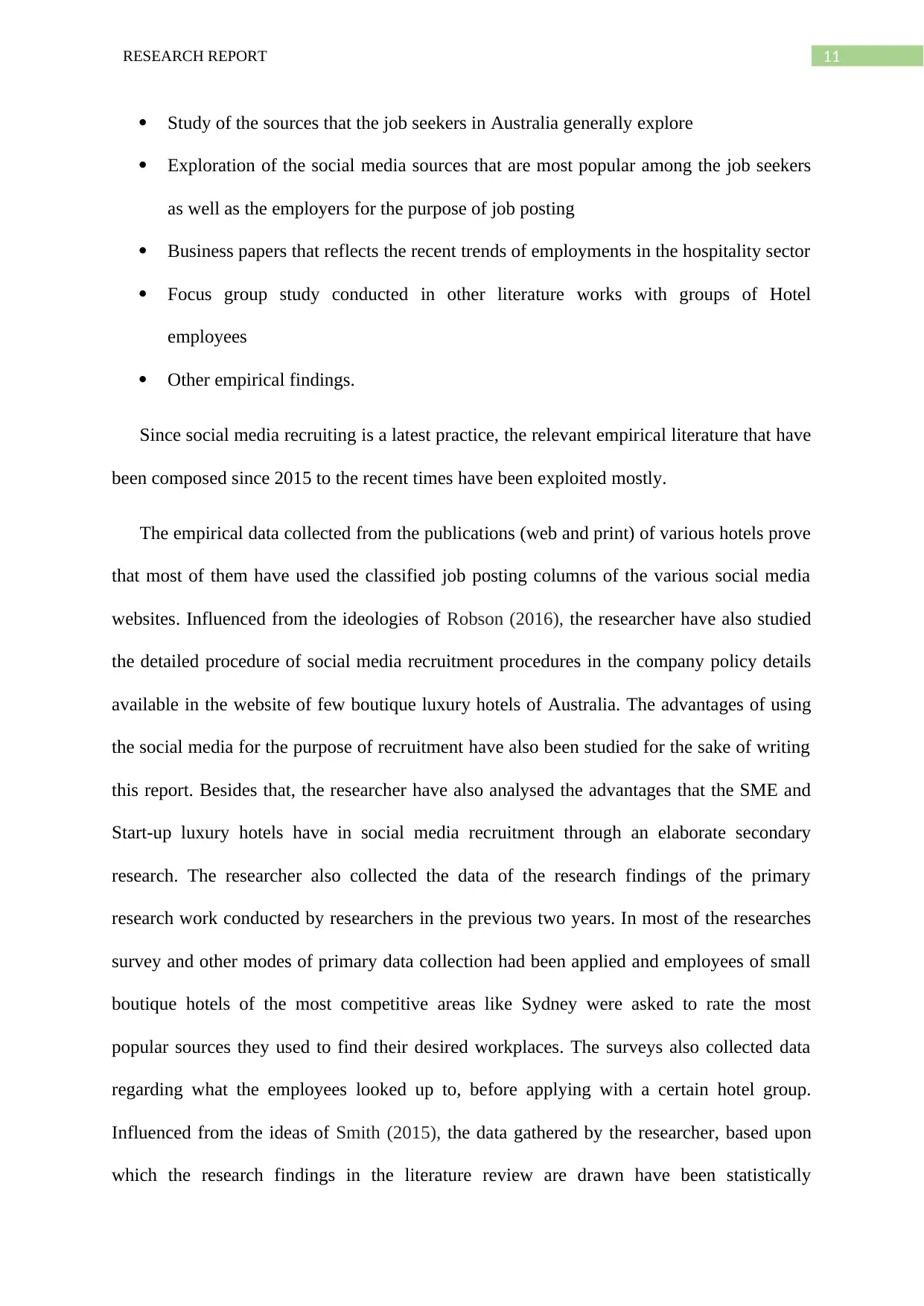
11RESEARCH REPORT
Study of the sources that the job seekers in Australia generally explore
Exploration of the social media sources that are most popular among the job seekers
as well as the employers for the purpose of job posting
Business papers that reflects the recent trends of employments in the hospitality sector
Focus group study conducted in other literature works with groups of Hotel
employees
Other empirical findings.
Since social media recruiting is a latest practice, the relevant empirical literature that have
been composed since 2015 to the recent times have been exploited mostly.
The empirical data collected from the publications (web and print) of various hotels prove
that most of them have used the classified job posting columns of the various social media
websites. Influenced from the ideologies of Robson (2016), the researcher have also studied
the detailed procedure of social media recruitment procedures in the company policy details
available in the website of few boutique luxury hotels of Australia. The advantages of using
the social media for the purpose of recruitment have also been studied for the sake of writing
this report. Besides that, the researcher have also analysed the advantages that the SME and
Start-up luxury hotels have in social media recruitment through an elaborate secondary
research. The researcher also collected the data of the research findings of the primary
research work conducted by researchers in the previous two years. In most of the researches
survey and other modes of primary data collection had been applied and employees of small
boutique hotels of the most competitive areas like Sydney were asked to rate the most
popular sources they used to find their desired workplaces. The surveys also collected data
regarding what the employees looked up to, before applying with a certain hotel group.
Influenced from the ideas of Smith (2015), the data gathered by the researcher, based upon
which the research findings in the literature review are drawn have been statistically
Study of the sources that the job seekers in Australia generally explore
Exploration of the social media sources that are most popular among the job seekers
as well as the employers for the purpose of job posting
Business papers that reflects the recent trends of employments in the hospitality sector
Focus group study conducted in other literature works with groups of Hotel
employees
Other empirical findings.
Since social media recruiting is a latest practice, the relevant empirical literature that have
been composed since 2015 to the recent times have been exploited mostly.
The empirical data collected from the publications (web and print) of various hotels prove
that most of them have used the classified job posting columns of the various social media
websites. Influenced from the ideologies of Robson (2016), the researcher have also studied
the detailed procedure of social media recruitment procedures in the company policy details
available in the website of few boutique luxury hotels of Australia. The advantages of using
the social media for the purpose of recruitment have also been studied for the sake of writing
this report. Besides that, the researcher have also analysed the advantages that the SME and
Start-up luxury hotels have in social media recruitment through an elaborate secondary
research. The researcher also collected the data of the research findings of the primary
research work conducted by researchers in the previous two years. In most of the researches
survey and other modes of primary data collection had been applied and employees of small
boutique hotels of the most competitive areas like Sydney were asked to rate the most
popular sources they used to find their desired workplaces. The surveys also collected data
regarding what the employees looked up to, before applying with a certain hotel group.
Influenced from the ideas of Smith (2015), the data gathered by the researcher, based upon
which the research findings in the literature review are drawn have been statistically
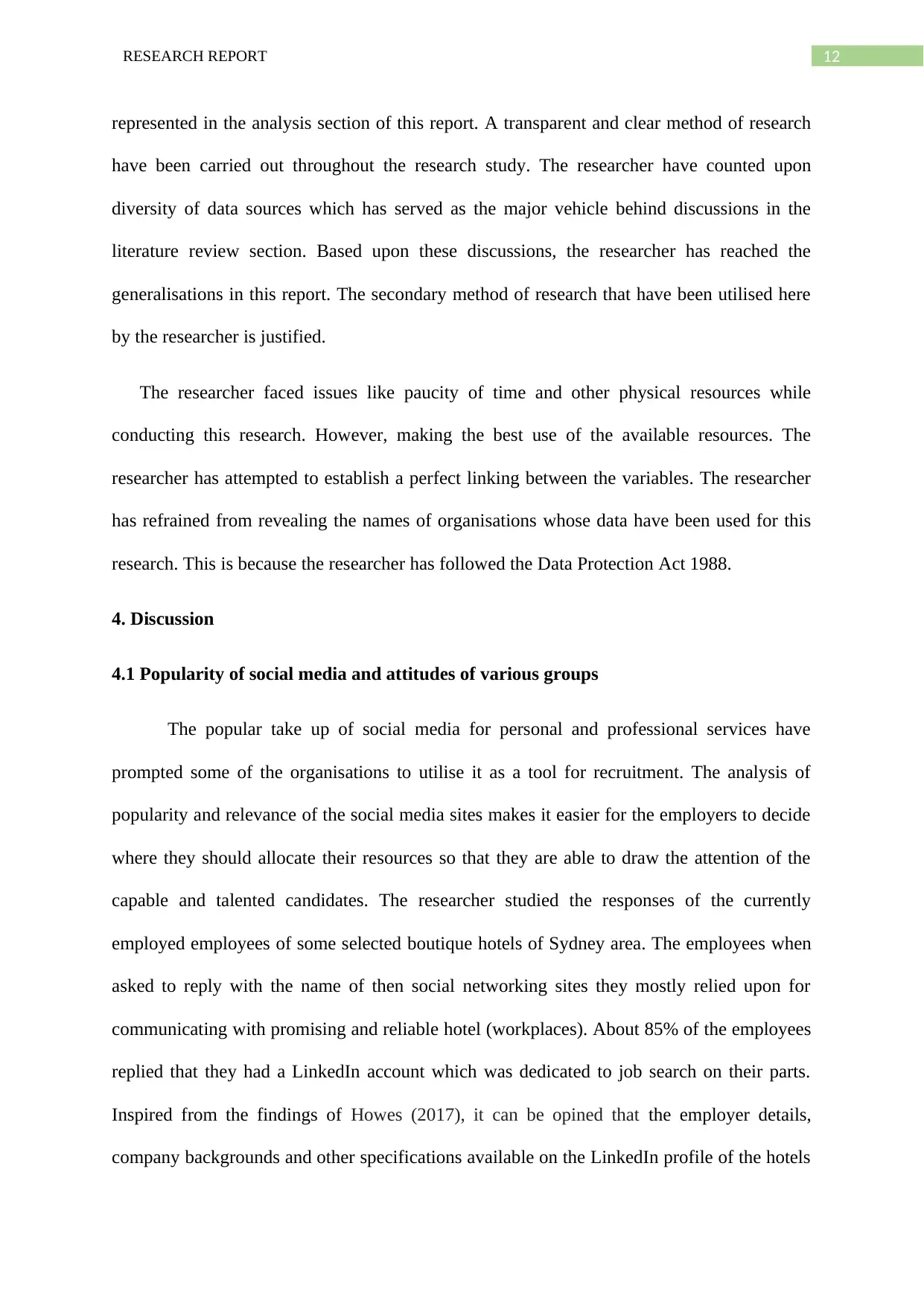
12RESEARCH REPORT
represented in the analysis section of this report. A transparent and clear method of research
have been carried out throughout the research study. The researcher have counted upon
diversity of data sources which has served as the major vehicle behind discussions in the
literature review section. Based upon these discussions, the researcher has reached the
generalisations in this report. The secondary method of research that have been utilised here
by the researcher is justified.
The researcher faced issues like paucity of time and other physical resources while
conducting this research. However, making the best use of the available resources. The
researcher has attempted to establish a perfect linking between the variables. The researcher
has refrained from revealing the names of organisations whose data have been used for this
research. This is because the researcher has followed the Data Protection Act 1988.
4. Discussion
4.1 Popularity of social media and attitudes of various groups
The popular take up of social media for personal and professional services have
prompted some of the organisations to utilise it as a tool for recruitment. The analysis of
popularity and relevance of the social media sites makes it easier for the employers to decide
where they should allocate their resources so that they are able to draw the attention of the
capable and talented candidates. The researcher studied the responses of the currently
employed employees of some selected boutique hotels of Sydney area. The employees when
asked to reply with the name of then social networking sites they mostly relied upon for
communicating with promising and reliable hotel (workplaces). About 85% of the employees
replied that they had a LinkedIn account which was dedicated to job search on their parts.
Inspired from the findings of Howes (2017), it can be opined that the employer details,
company backgrounds and other specifications available on the LinkedIn profile of the hotels
represented in the analysis section of this report. A transparent and clear method of research
have been carried out throughout the research study. The researcher have counted upon
diversity of data sources which has served as the major vehicle behind discussions in the
literature review section. Based upon these discussions, the researcher has reached the
generalisations in this report. The secondary method of research that have been utilised here
by the researcher is justified.
The researcher faced issues like paucity of time and other physical resources while
conducting this research. However, making the best use of the available resources. The
researcher has attempted to establish a perfect linking between the variables. The researcher
has refrained from revealing the names of organisations whose data have been used for this
research. This is because the researcher has followed the Data Protection Act 1988.
4. Discussion
4.1 Popularity of social media and attitudes of various groups
The popular take up of social media for personal and professional services have
prompted some of the organisations to utilise it as a tool for recruitment. The analysis of
popularity and relevance of the social media sites makes it easier for the employers to decide
where they should allocate their resources so that they are able to draw the attention of the
capable and talented candidates. The researcher studied the responses of the currently
employed employees of some selected boutique hotels of Sydney area. The employees when
asked to reply with the name of then social networking sites they mostly relied upon for
communicating with promising and reliable hotel (workplaces). About 85% of the employees
replied that they had a LinkedIn account which was dedicated to job search on their parts.
Inspired from the findings of Howes (2017), it can be opined that the employer details,
company backgrounds and other specifications available on the LinkedIn profile of the hotels
⊘ This is a preview!⊘
Do you want full access?
Subscribe today to unlock all pages.

Trusted by 1+ million students worldwide
1 out of 27
Related Documents
Your All-in-One AI-Powered Toolkit for Academic Success.
+13062052269
info@desklib.com
Available 24*7 on WhatsApp / Email
![[object Object]](/_next/static/media/star-bottom.7253800d.svg)
Unlock your academic potential
Copyright © 2020–2025 A2Z Services. All Rights Reserved. Developed and managed by ZUCOL.





